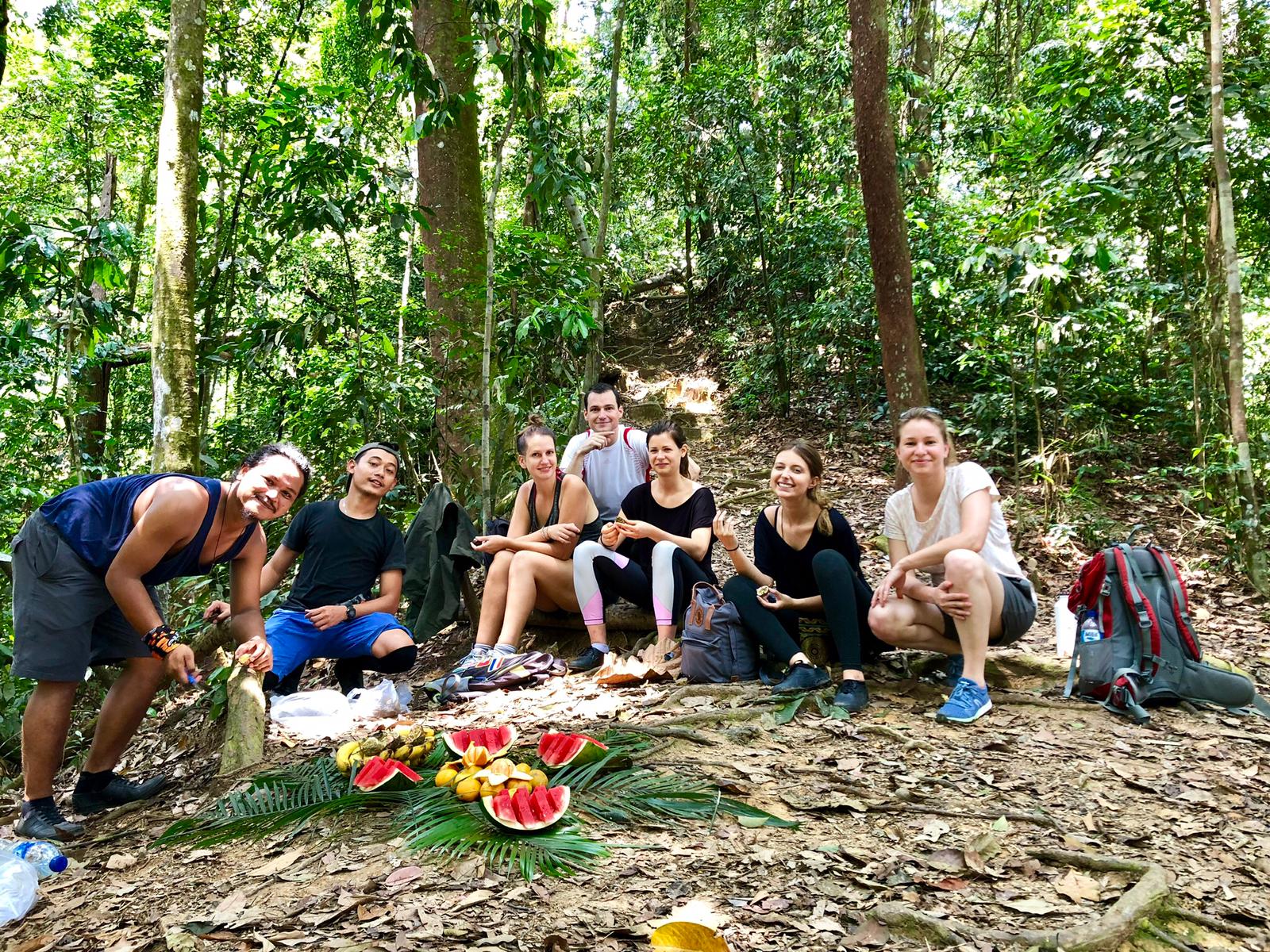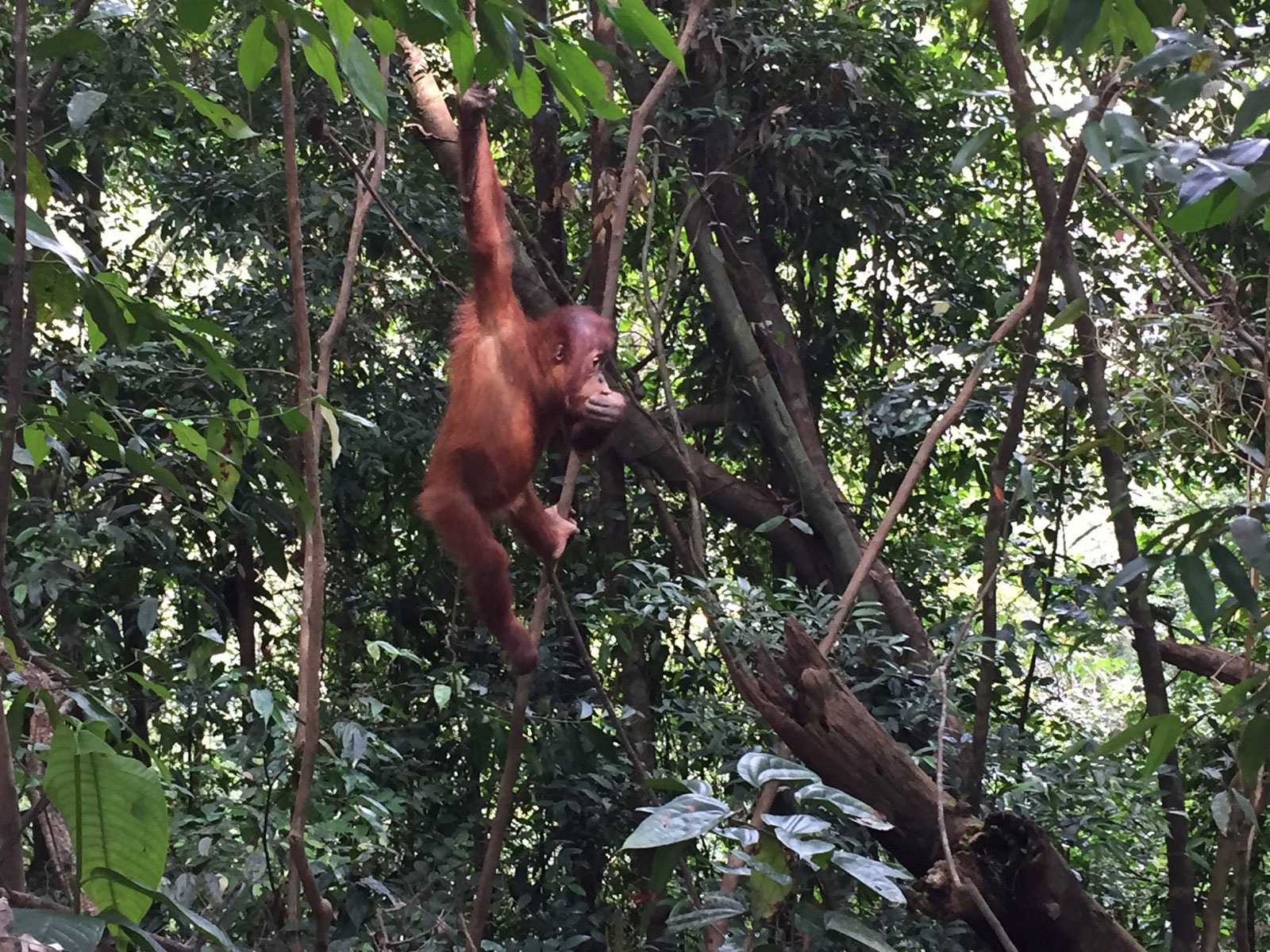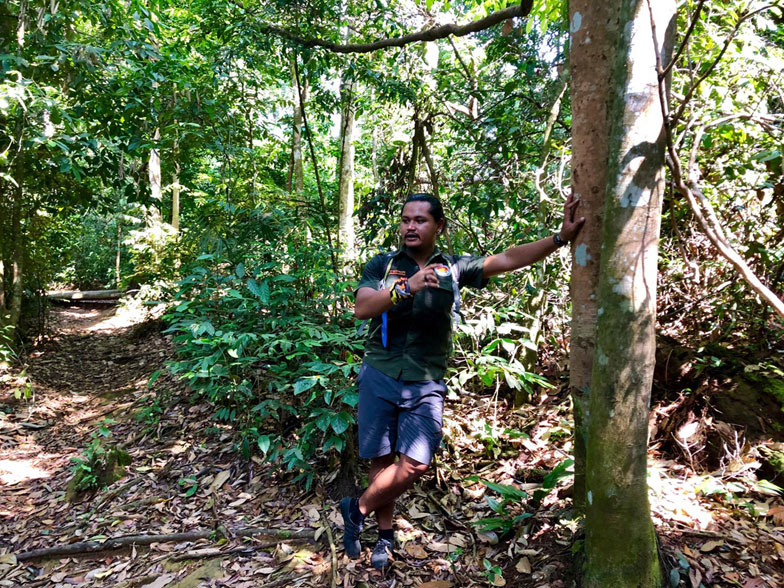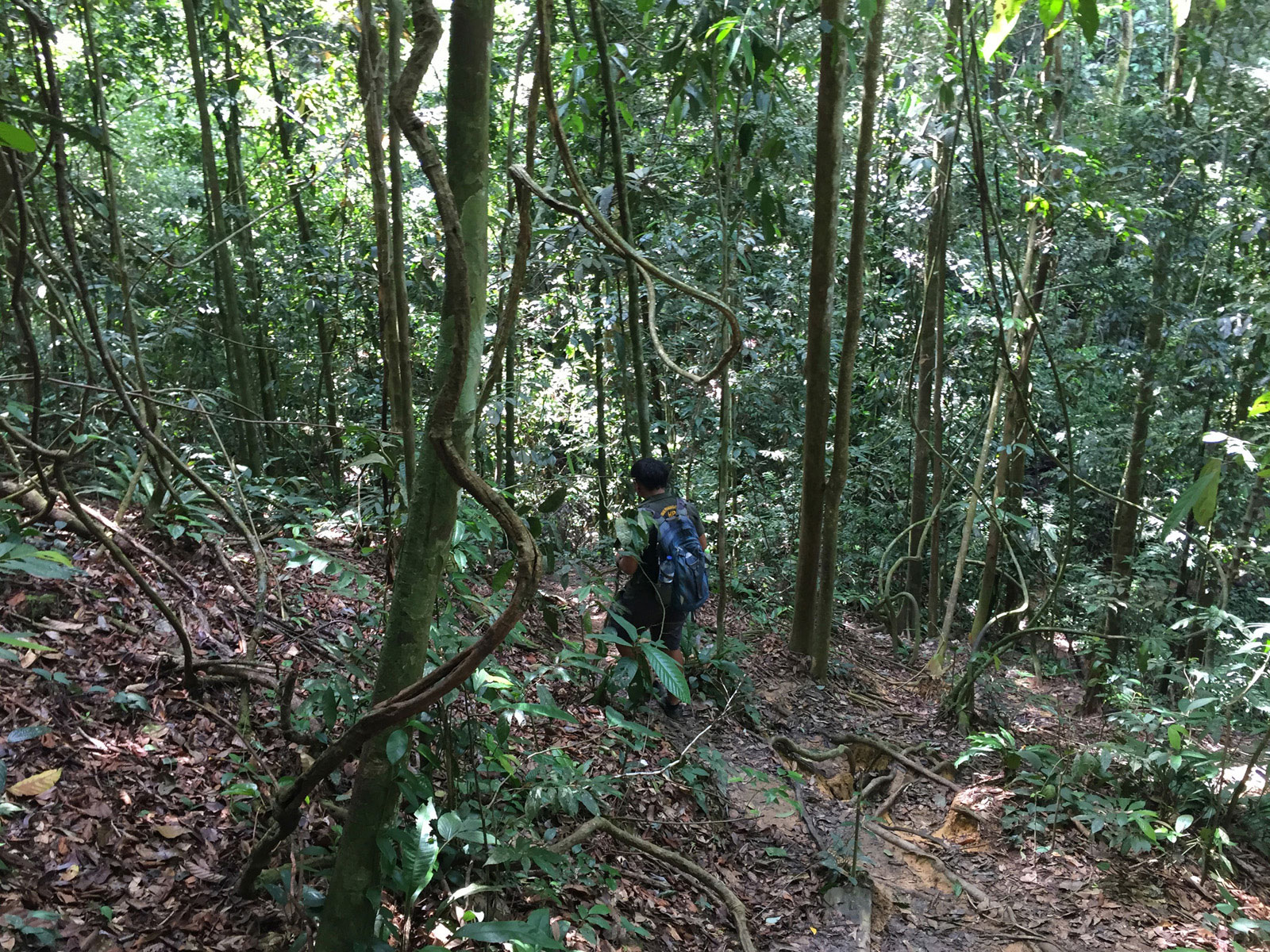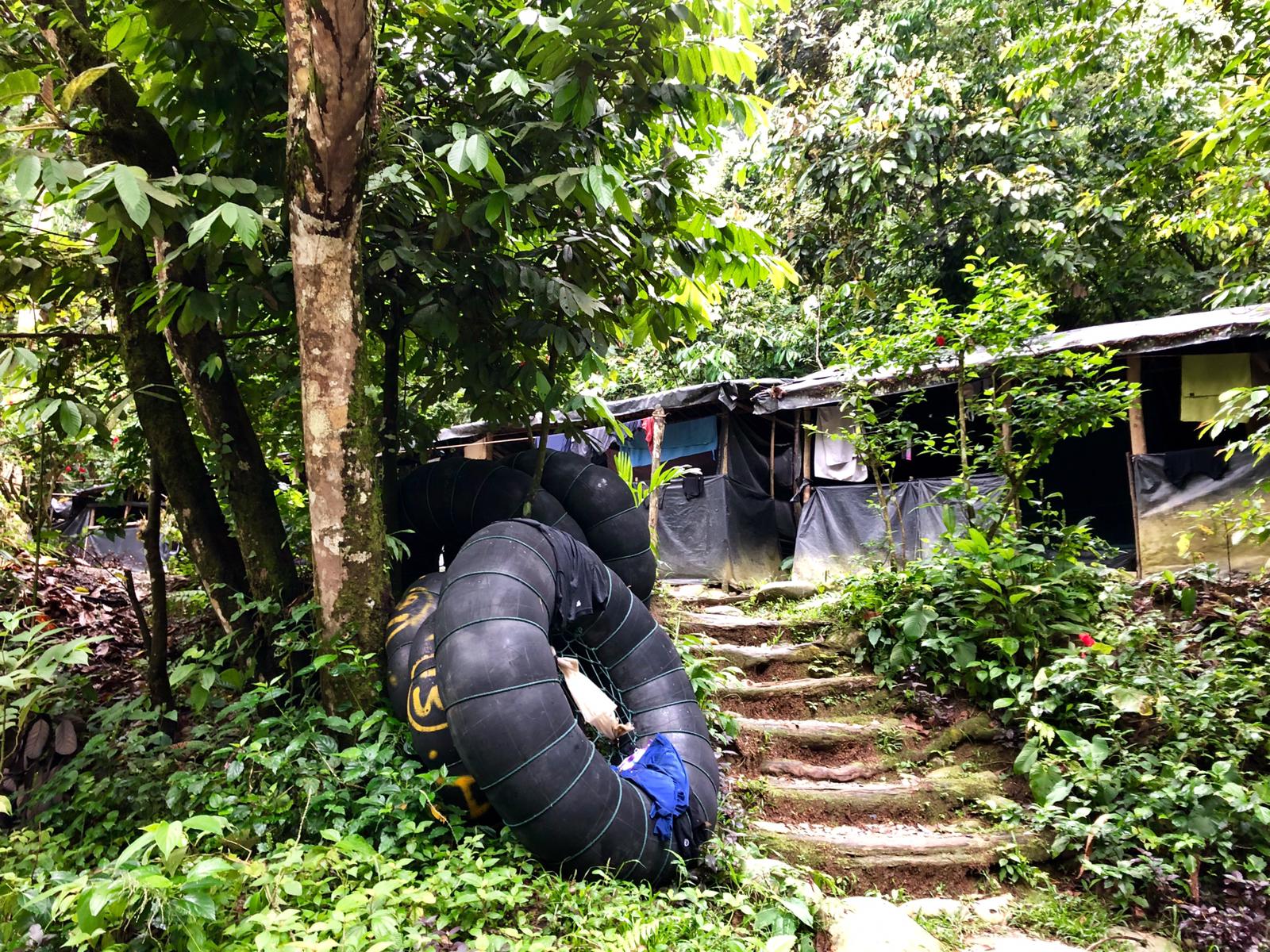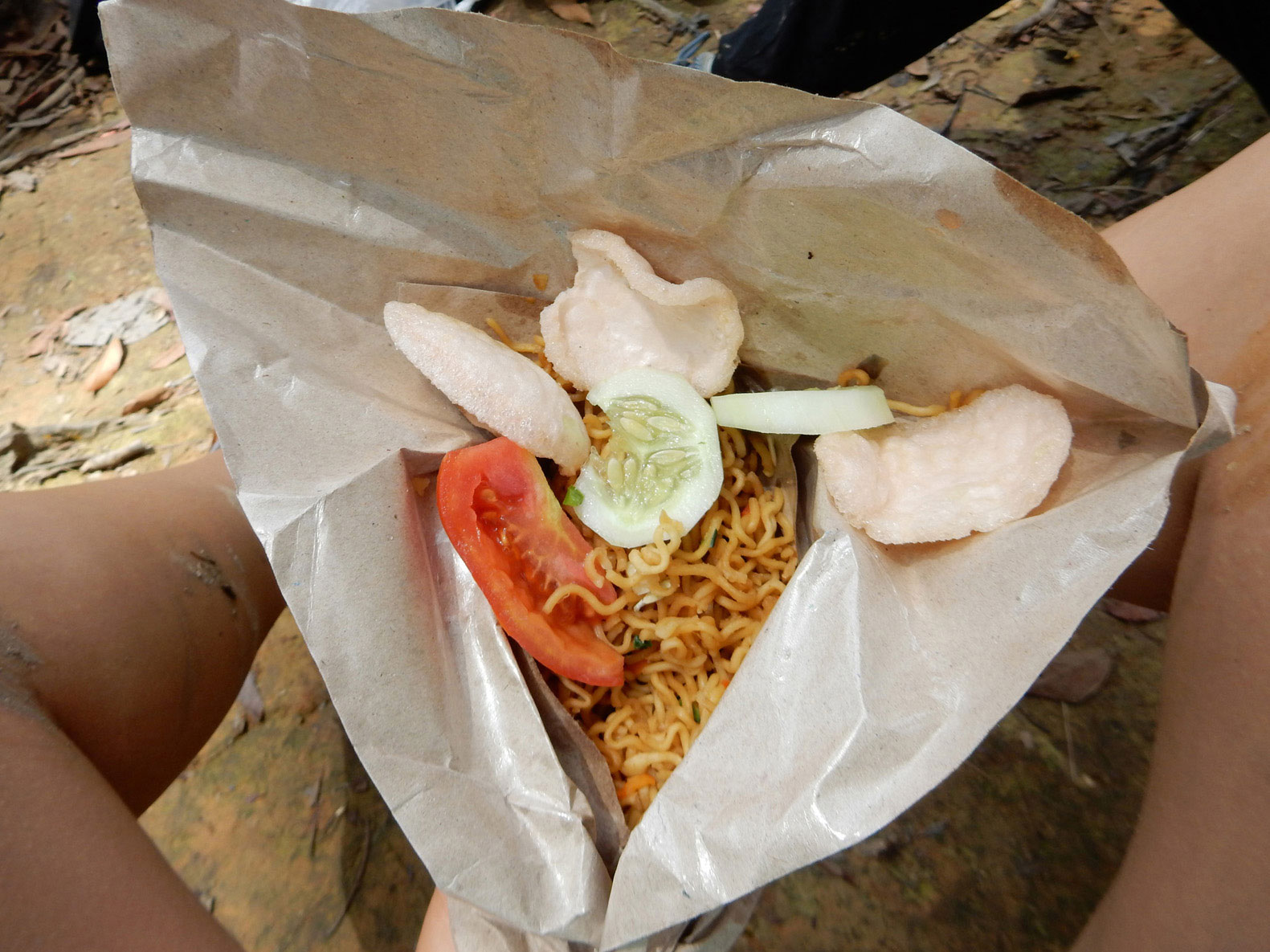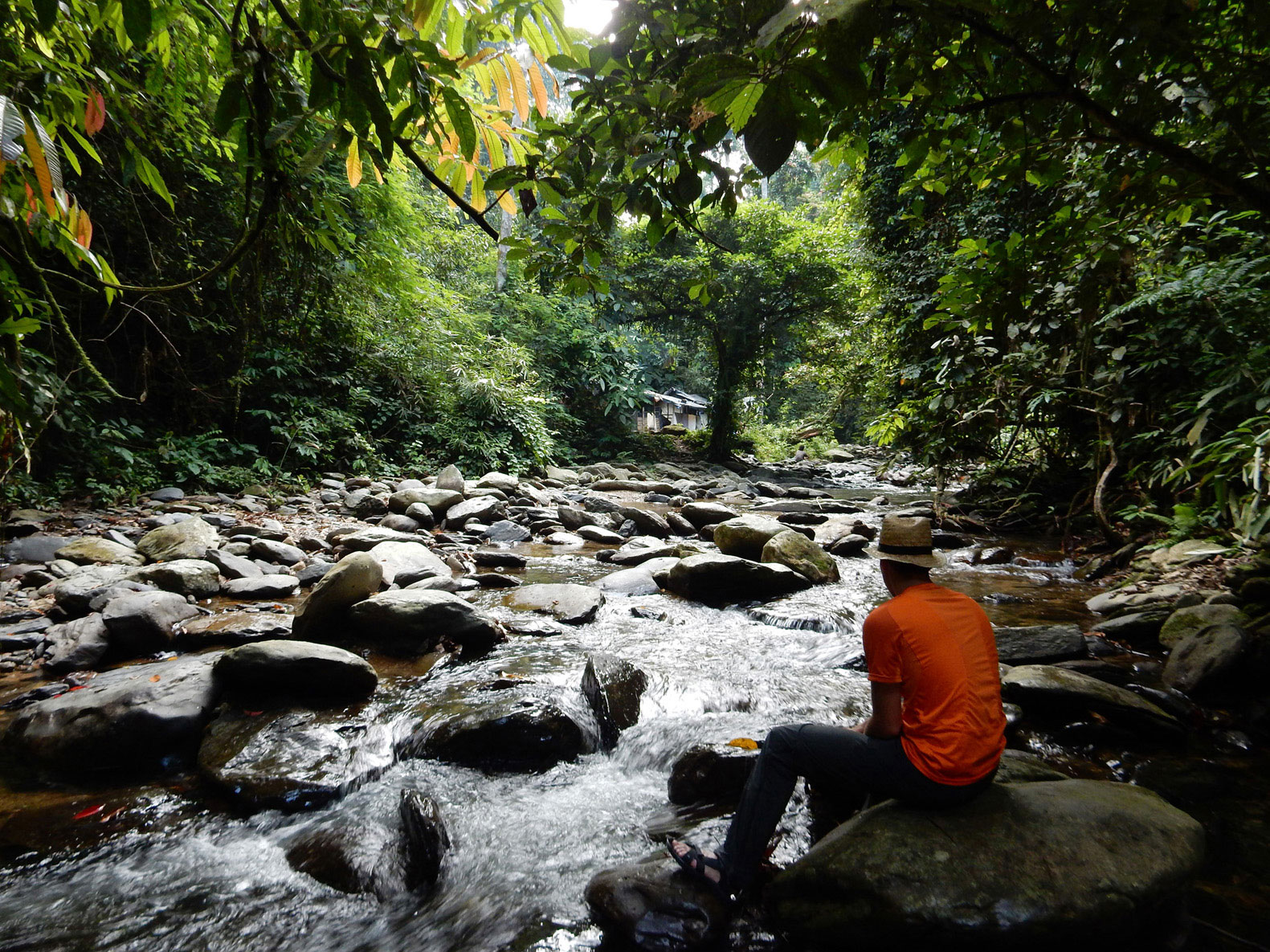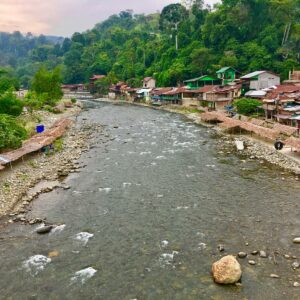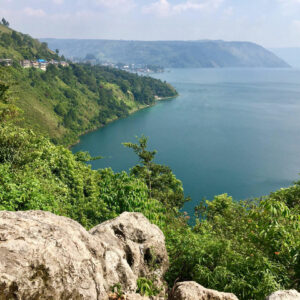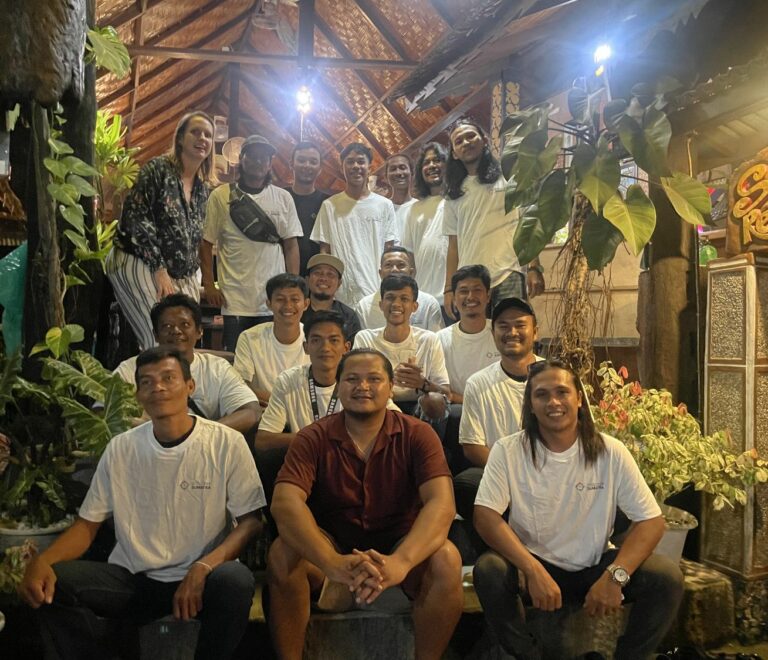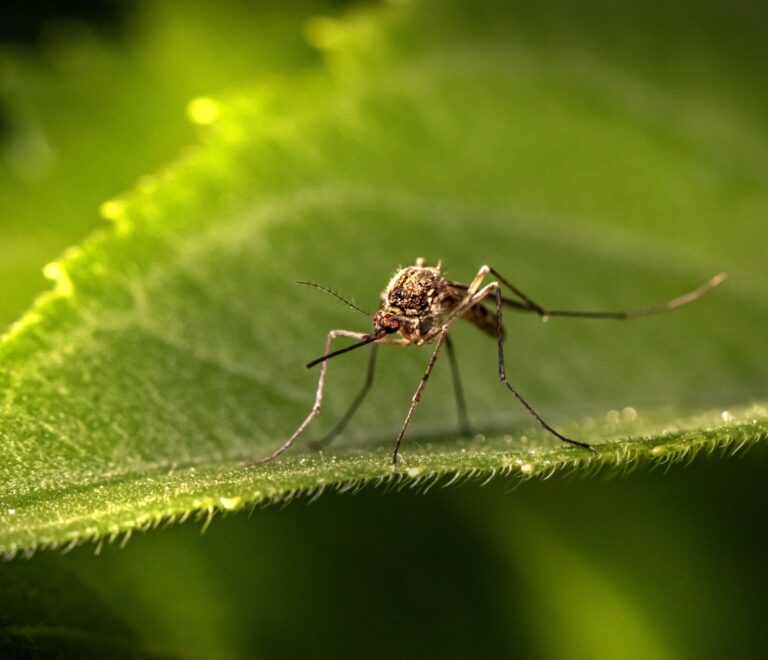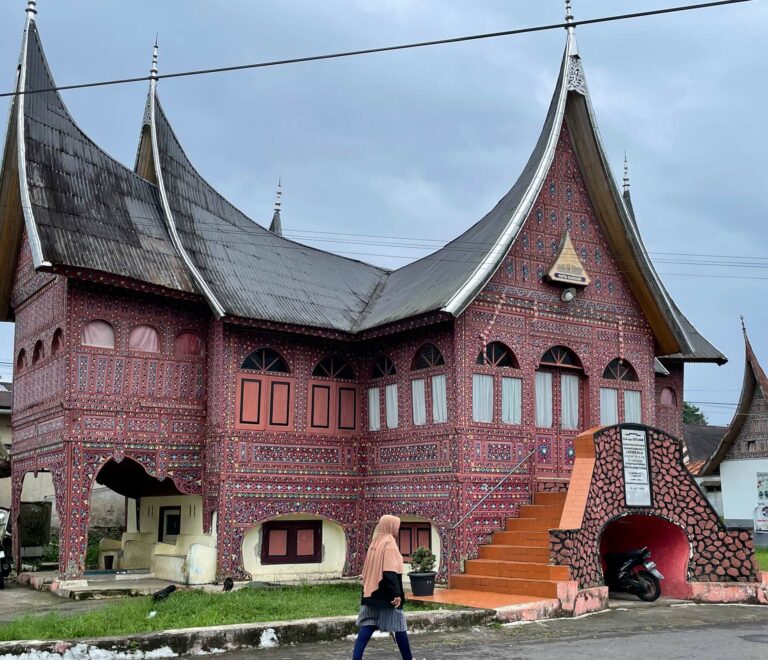Jungle trekking in Bukit Lawang in Sumatra is a unique experience. You can see orangutans in their natural environment, but also monitor lizards, gibbons, snakes or toucans. There are different routes for all fitness levels. From a short 3-hour hike to an eventful 3-day tour with overnight stays in the jungle. Many people are afraid or don’t know exactly what to expect on a jungle tour in the Sumatra rainforest. And we understand that. Trekking in Gunung Leuser National Park is not comparable to a leisurely walk in the forest at home. That’s why we created this overview to answer the most frequently asked questions. And if you are still worried or have any further questions, just contact us.
About jungle trekking in Bukit Lawang
History of Jungle Trekking in Bukit Lawang
In 1973, two zoologists from Switzerland founded an orangutan rehabilitation center in Bukit Lawang. It sounds crazy, but orangutans were (and sometimes still are) kept as pets throughout Indonesia.
The center was founded to bring animals released from captivity back into the jungle. It was funded by the WWF and the Frankfurt Zoological Society. The center was built a few kilometers outside Bohorok to minimize human contact. The rangers taught the orangutans all the skills necessary to survive in the wild. After a period of quarantine, refamiliarization with the rainforest and reintegration into the (semi-)wild orangutan population, the animals were released back into the wild. The opportunity to see orangutans up close brought local and international tourists to Bukit Lawang.
In addition to the rehabilitation center, the first jungle treks for tourists were carried out at the end of the 80s. It must have been a real adventure back then. The ITGA-HPI, the Indonesian Association of Tour Guides, has existed since the early 1990s. All tour guides who want to lead tourists into the jungle have always had to pass an exam. All of our guides are licensed by ITGA-HPI, speak English very well, have been trained accordingly and had to pass an exam.
The center was closed in 2002 because it was no longer suitable for the welfare of the animals. All of the center’s orangutans were slowly released into the jungle. That’s why you can still see some semi-wild orangutans while jungle trekking in Bukit Lawang. These semi-wild orangutans are used to people and sometimes they want to touch you. If this happens, stay calm and follow your guide’s instructions.
For guests who decide on the exciting trekking tour lasting several days, there have been permanent camps in the jungle for several years. This makes trekking a little more comfortable.
The jungle
Gunung Leuser National Park is a delicate but very diverse ecosystem. It is threatened by deforestation, palm oil plantations and poaching. Read more about the palm oil problem . And many of the wild animals are also in danger. This rainforest is home to rare mammals such as the mighty Sumatran tiger, rhinoceros, elephant and Malaysian honey bear, all of which are endangered species. The continuous destruction of the rainforests around Bukit Lawang has brought the orangutans to the brink of extinction. There are currently only approximately 14,000 remaining orangutans in the wild, making this species classified as endangered. The Sumatran Orangutan Society is one of the NGOs that contributes to the protection of the ecosystem. Making people aware of the crisis surrounding the orangutans and other wildlife in the national park is one of our goals. We also believe that responsible and ethical jungle trekking will help save the rainforest by providing tourists with a high level of care and education. We oppose unnatural and abusive practices and strive to improve animal welfare and promote education.
On a hike in Gunung Leuser National Park you will not only encounter orangutans, but also Thomas Leaf monkeys, toucans, snakes, monitor lizards, gibbons, macaques, many insects and huge butterflies.
Facts about trekking
Guides
How do you find a good guide?
It is important that you do your research before choosing a guide. Jungle trekking in Bukit Lawang is only possible with a guide. Unfortunately, some of the guides are not licensed and feed the orangutans so that they get closer to the tourists. These animals are 96% like us humans and therefore feeding them is very dangerous. Infections and diseases can be easily transmitted.
Your guide should be licensed by ITGA-HPI, the Indonesian Tour Guides Association. This means they had to pass a test, speak English very well and were trained about the jungle. This training lasts 2 years. If in doubt, ask your guide to show you the license card.
All our guides were born and raised in Bukit Lawang. They all share a love for Sumatra’s nature, culture and wildlife. They are all professional trekking guides with many years of experience in jungle tours. Each of them is licensed by ITGA-HPI, the Indonesian Tour Guides Association. This means they had to pass a test, speak English very well and were trained about the jungle. This training lasts 2 years.
So when you choose jungle trekking in Bukit Lawang with us, you are in good hands. We want to protect the rainforest and its flora and fauna. The Gunung Leuser ecosystem is already in danger from deforestation, poaching and palm oil plantations. To save this beautiful jungle, we only work with guides who love and respect the jungle and do not feed or touch animals.
We always provide two guides for jungle trekking. If you are traveling with small children, we can also provide you with an additional guide to give special care to the little ones.
Jungle trekking without a guide is not permitted.
Read our post on how to find a good trekking guide in Bukit Lawang here .
Prices
Prices for jungle trekking in Bukit Lawang are fixed. If someone offers you cheaper prices than those listed below, be suspicious. The fixed prices you pay ensure that the guides are well trained, receive a good salary to help their families and care about your safety while trekking. If in doubt, ask the guide to show you his HPI license card.
3 hours
55 euros/person
1 day
70 euros/person
2 days
120 euros/person
3 days
170 euros/person
All our prices include pickup from your accommodation, English speaking guide, national park entrance fees, fruits/meals, water/tea/coffee at camp (if overnight in the jungle), sleeping gear (for overnight stays), rafting, first aid if required and lots of fun, interesting facts and great memories!
Here is a breakdown of the cost for 2 people for a 2 day hike:
Permit: 20 euros
HPI fee: 4 euros
Food: 16 euros
Guide: 70 euros
Guide assistant: 40 euros
Cook/camp/rafting: 80 euros
Here you can see that many people are involved and everyone gets a reasonable salary for Indonesian standards. When you negotiate the price, you not only agree to poor pay but also reduce the quality and safety of your trekking. Everyone loses. So if a guide offers you a big discount, be careful.
Trekking
On our jungle tours you hike through an ancient rainforest. Experience this natural wonder up close, swing on a vine, listen to the sounds of the animals and breathe in the smell of the plants. And last but not least, you will see wonderful orangutans and other wildlife in the wild. You can be sure that this will be an unforgettable experience. But let’s be honest. The hike is not a Sunday walk in the forest. You run over uneven ground, climb over roots and tree trunks, and hike on steep paths where you have to hold on to roots and lianas. The humidity and the occasional rain shower make for further exertion. But you will be rewarded with great jungle views as you see animals in the wild and swim in the river afterwards.
No previous knowledge of trekking is required. Jungle trekking in Bukit Lawang is suitable for all fitness levels and backgrounds. Christine has had many knee surgeries and has done several hikes in Bukit Lawang with no problems. If you have any medical problems or injuries or are pregnant, please inform us in advance so that we can inform our guides and take precautions if necessary.
The trekking tour starts from your accommodation in Bukit Lawang and our guides will also take you back there.
Itinerary
After breakfast, your guides will pick you up from your accommodation at 9 a.m. and you will go into the jungle together. You can leave your luggage in your accommodation. You will then hike for approximately 6 – 8 hours (except for the 3 hour trek), including breaks, photo stops and lunch. You can spot orangutans as well as monitor lizards, gibbons, snakes, toucans, giant ants and other amazing insects. Your guides will tell you a lot about the jungle, its flora and fauna, and how the locals use some plants for traditional medicine.
After a while you will take a break and our guides will serve you some delicious fruits before continuing your jungle adventure. You will hopefully see more animals and have breathtaking viewpoints. Once you decide to do the 3-hour hike, head back to Bukit Lawang. If you choose one of the other hikes, there is another stop for a local lunch (usually fried noodles or rice) in the jungle.
Arrive at the river in the late afternoon. For the 1-day trek, you will raft back to Bukit Lawang. For the multi-day hikes, you stay in the camp by the river. The afternoon is at your leisure, jump in the river or relax. Our chef will provide you with a delicious Indonesian dinner and then you will sit together by candlelight, listening to the sounds of the jungle, playing cards or chatting. The overnight stay takes place in a semi-open shelter, surrounded by the sounds of the river and the jungle.
For the two-day trek, you will either continue trekking on the second day or visit a nearby waterfall (depending on the campsite). You will return rafting around midday/early afternoon. For the 3 days trek, you will continue trekking for 6 hours and reach the next campsite.
Families
If you are traveling with children, we will always find a trail in the jungle that covers all fitness levels. For children we recommend a minimum age of 5 years and they should be able to walk well. If you have younger children or are unsure, we can always provide you with an additional guide (then three guides in total). He will take special care of you and the small children and can return with you in the worst case scenario. A baby carrier/carrying backpack for toddlers can be handy.
Jungle camp
If you choose the popular multi-day overnight trek in the jungle, you’ll sleep in a semi-open shelter by the river. The accommodation is very simple. We provide you with a mattress, blankets, pillows and a mosquito net, so you don’t need to bring anything with you for your overnight stay.
Your guides sleep right next door. If something is wrong, just call and they will come straight away. The “toilets” are squat toilets behind the shelters a small part of the forest. And yes, it’s a bit scary in the dark (don’t forget your headlamp!). But if in doubt, you can go in pairs or ask the guide for help. And at night you can simply do your little business near the shelter; no one will see you in the jungle darkness anyway.
Meals during the trek
Nobody has to starve during our jungle experiences. Depending on which hike you choose, food is always included. Get delicious local fruits on a 3-hour hike. On a 1 day tour we will offer fruits and a vegetarian lunch. On a 2-day jungle trek, there is fruit and lunch during the trek as well as a delicious dinner at the camp and breakfast in the morning. The 3 day trek has the same food as the 2 day trek, just with an additional day.
Please bring water with you before starting your hike. If you stay overnight, our chef will provide you with more water. There is also tea and coffee available at the campsite.
If you follow specific diets, are vegetarian/vegan or have allergies, please let us know in advance and we will try to accommodate your requests.
Packing list
Jungle trekking can cause some unplanned situations – from weather changes to exhaustion to health problems. That’s why it’s better to be prepared for anything. Here is a packing list for jungle trekking in Bukit Lawang. Try to make your luggage as light as possible.
Small backpack, change of clothes, rain jacket, swimwear, towel, toilet paper, personal hygiene products, medicine, camera, waterproof bag (if available), mosquito repellent, sunscreen, flashlight, sandals/flip-flops (for walking around the camp).
Hygiene products: We recommend bringing natural soap and shampoo. Most common products contain microplastics. By using natural products, you can help keep microplastics out of the delicate ecosystem.
Clothing: Nights can get chilly in the jungle, so we recommend bringing long sleeve shirts and pants/leggings. Wearing comfortable clothing is the most important thing. It is not necessary to wear long clothes while trekking as there are few mosquitoes and leeches.
You can leave your remaining luggage at your accommodation.
Shoes: No special hiking shoes are required, but you can of course use them. Sneakers and sneakers with good soles are also fine.
Health and insurance
We are prepared for minor illnesses and injuries (stomach aches, rashes, scratches, bee stings…). The nearest doctor is about 5km outside Bukit Lawang and can deal with fever and infections. If you are seriously ill or injured, you will need to go to the hospital in Medan. We strongly recommend travel health insurance that covers hospital and transport costs. Discover Sumatra does not offer health insurance.
Rules of conduct in the jungle
1. Listen to your guide
Our guides are well trained and know the jungle like the back of their hand. They care about everyone’s safety, so it’s important to listen to them in the jungle.
2. Do not feed or touch animals
We know it’s tempting to touch or feed animals while jungle trekking. But for the sake of you and the animals, we are strictly against it. Listen to your guide about what to do if you encounter wildlife. Orangutans in particular share 96% DNA with us, so any disease is easily transmittable and can even kill the animals.
3. Be calm and keep your distance
You visit the natural habitat of many animal species. Respect your surroundings and be calm. Also, don’t get close to wild animals. We recommend a distance of 5-10 meters. Orangutans are very strong, they can easily break your bones. That’s why we ask you to always keep your distance. The jungle is not a zoo, wild animals are unpredictable. The semi-wild orangutans from the former rehabilitation center are used to humans. And sometimes they want to touch you. If this happens, stay calm and follow your guides’ instructions.
4. Keep the jungle clean
Leave nothing but footprints and take your trash with you. Our guides provide garbage bags. Even if you see trash from others. Take it with you. This also applies to fruit bowls. The human germs on them can also infect animals.
5. Be respectful
Gunung Leuser National Park is a delicate ecosystem. Please do not destroy or pick plants, harm animals or take any fruit with you.
6. Just enjoy
Our guides will take care of everything and make sure you have fun. We ask you to follow the jungle rules mentioned above and you will have a unique experience.
Our trekking tours in Bukit Lawang
3 hour trek
Our three-hour trek gives you a brief overview of the jungle of Gunung Leuser National Park, including an English-speaking guide, fruit and entrance fee to the national park.
1 day trek
Spend a day in the jungle. The trek includes 6-7 hours of trekking, meals (lunch, fruits) and rafting to Bukit Lawang. Here you have a higher chance of seeing orangutans.
2 day trek
Our popular 2-day trek is ideal if you want to spend a night in the jungle. The trek includes an English-speaking guide, meals, national park entry, equipment, rafting.
3 day trek
Go deeper into the jungle and increase your chances of spotting orangutans and other wildlife. Camp by the river, fall asleep to the sounds of the jungle and swim in waterfalls.

